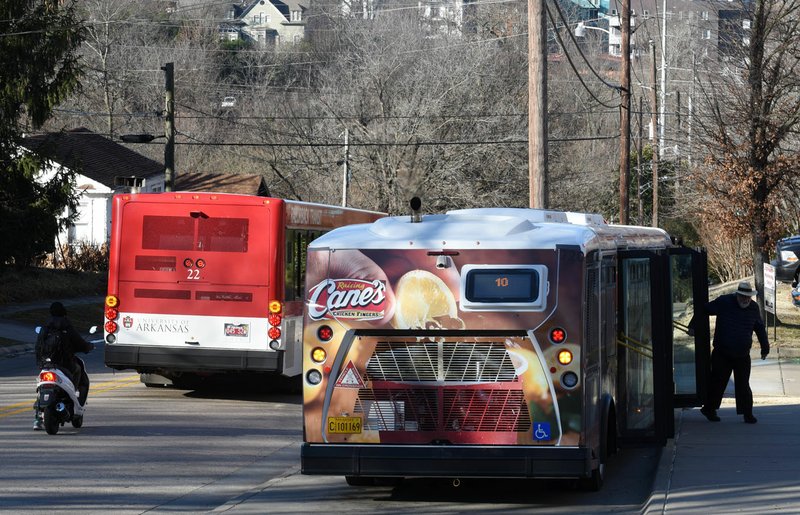SPRINGDALE -- Passengers in two more cities are riding public transit buses free.
Rogers and Springdale partnered with Ozark Regional Transit and joined Fayetteville to pay for the fares on fixed routes.
Fares
Paid fares for adults on Ozark Regional Transit, in areas without free fares, is $1.25; youth and students ride for $1; and, seniors pay 60 cents. A monthly pass for adults is $30; youth and students pay $15 per month; and seniors $15. An unlimited day pass is $3 and a 10-ride pass is $10. Seniors older than 75, veterans, and children under six ride free.
Source: ORT
"I have pushed for this for multiple years based off the concept that transit is one of the many forms of transportation that Arkansans use to get throughout their community," said Joel Gardner, executive director at Regional Transit.
"We have roads, sidewalks, bicycle trails and transit," Gardner said. "Of those four tax supported ways to get around, only one has a user fee."
Gardner said ridership has increased in all three cities since going fare-free. He expects ridership numbers at the end of the month. Rogers and Springdale went to free fares Jan. 1. A full-price fare for adult riders is usually $1.25.
Springdale's budget for this year includes $361,710 for regional transit, up from $280,000 in 2019. Of the total, $36,990 is covering the fares, according to city and transit officials.
Springdale Mayor Doug Sprouse said his city also increased its contribution so it can give drivers and other employees a raise.
The free fares are the city providing another public service for the community, Sprouse said.
"Not as many people ride ORT as we'd like to see, but it is growing, and the people who do use it really need it. They're going to work. They're going to shop. They're going to school. They're going to the doctor," Sprouse said. "They're using it in areas that they really need it, and it helps us, too. If they're using ORT to shop, then it's a benefit to our community."
Springdale has three fixed routes.
Rogers contribution this year to Regional Transit is $467,670. The increase of $267,670 from 2019 helps pay for more routes and the free fares. Rogers has two fixed routes.
Fayetteville contributed $532,228 to ORT in 2020, up from $486, 408 in 2019. Fayetteville, which went fare-free in 2018, also pays $63,700 in makeup fees for free fares. Fayetteville has three fixed routes.
Bentonville, which doesn't have free fares, contributed $125,757 in 2019 and 2020. Bentonville has one fixed route.
As of Monday two new transportation enhancements became available in Rogers.
Route 54 is a fixed route connecting downtown to the Pinnacle Hills area. Route 54 starts at South Second Street and West Elm Street, proceeds south and west via Eighth Street, New Hope Road, South Hampton Place, South Bellview Road, South Promenade, West Pauline Whitaker Road, South Pinnacle Hills Parkway and ends at J.B. Hunt Towers along South J.B. Hunt Drive.
Riders can then transfer to the Route 490 Express north to Bentonville and south to Springdale and Fayetteville. The route returns to its initial point to complete a full circuit.
Then there is also On-Demand Transit, an application-based, real-time route service with numerous bus stops in the city, similar to ride hailing apps.
On-Demand Transit allows a rider to schedule trips using an application on a mobile phone, desktop computer or by calling the Transit office, (479) 756-5901.
In typical fixed-route service, the bus must constantly travel along the same path regardless of the conditions, such as heavy traffic, accidents or construction, according to Gardner. But, the on-demand model, allows the bus driver to use any path to get from point A to point B, avoiding known obstacles.
In fixed-route service, if a passenger is at the Rogers Police Department and wants to go downtown but the bus is going uptown, the rider has two choices, either get on the bus and go uptown and stay on it until it goes downtown or, wait until the bus turns around, comes back to the stop and get on it to go downtown, Gardner said.
In the on-demand model, the rider can select a pickup location and drop off location and the bus driver can turn around at the nearest safe place in the route and take the passenger directly from the police department to their downtown stop.
The on-demand software was created by Pantonium, a Canadian company, and was first rolled out in Bellview, British Columbia.
"We are excited to offer these transportation opportunities for those residing in and visiting the city of Rogers for zero fare," Mayor Greg Hines said. "Our hope for this program is to provide our citizens with fast, safe and reliable access to work, meetings, shopping and events within the city, and, considering the buses will have bike racks, bicyclists will also be able to easily access all of our beautiful trail systems."
Both enhancements will run from 7 a.m. to 5:30 p.m. Monday through Friday and observe all of the transit's scheduled holidays.
NW News on 01/26/2020

